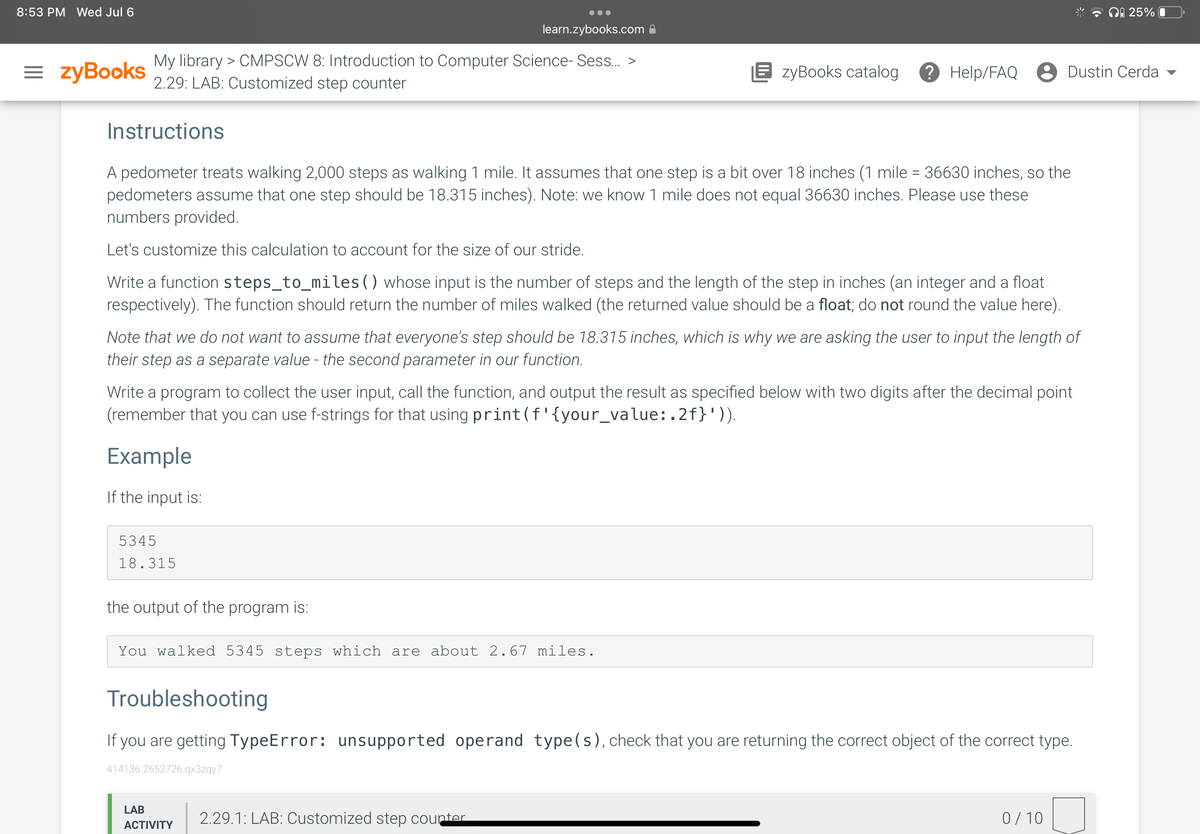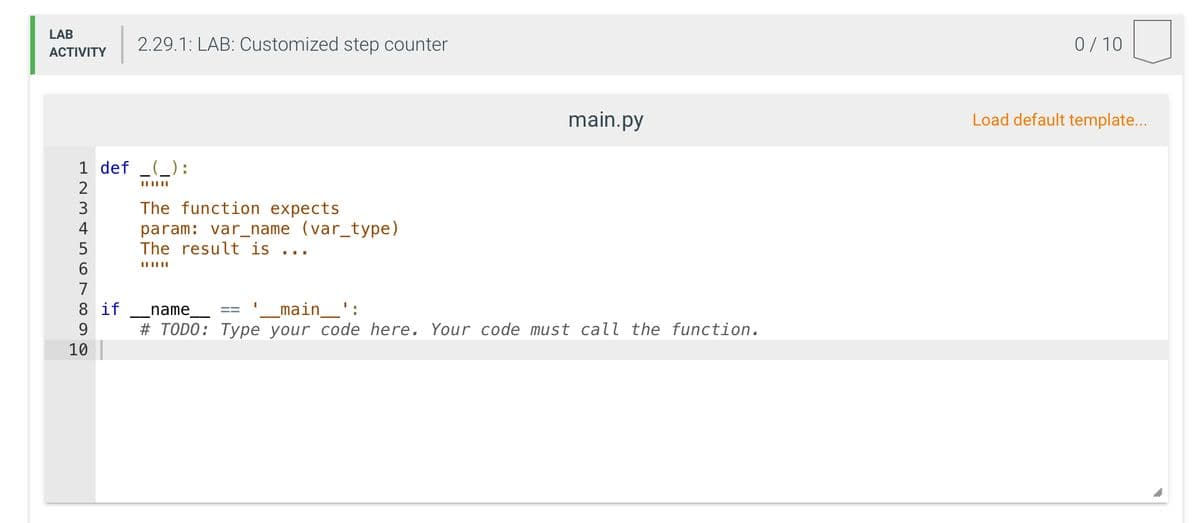Instructions A pedometer treats walking 2,000 steps as walking 1 mile. It assumes that one step is a bit over 18 inches (1 mile = 36630 inches, so the pedometers assume that one step should be 18.315 inches). Note: we know 1 mile does not equal 36630 inches. Please use these numbers provided. Let's customize this calculation to account for the size of our stride. Write a function steps_to_miles () whose input is the number of steps and the length of the step in inches (an integer and a float respectively). The function should return the number of miles walked (the returned value should be a float; do not round the value here). Note that we do not want to assume that everyone's step should be 18.315 inches, which is why we are asking the user to input the length of their step as a separate value - the second parameter in our function. Write a program to collect the user input, call the function, and output the result as specified below with two digits after the decimal point (remember that you can use f-strings for that using print (f'{your_value: .2f}')). Example If the input is: 5345 18.315 the output of the program is: You walked 5345 steps which are about 2.67 miles. Troubleshooting If you are getting TypeError: unsupported operand type (s), check that you are returning the correct object of the correct type.
Instructions A pedometer treats walking 2,000 steps as walking 1 mile. It assumes that one step is a bit over 18 inches (1 mile = 36630 inches, so the pedometers assume that one step should be 18.315 inches). Note: we know 1 mile does not equal 36630 inches. Please use these numbers provided. Let's customize this calculation to account for the size of our stride. Write a function steps_to_miles () whose input is the number of steps and the length of the step in inches (an integer and a float respectively). The function should return the number of miles walked (the returned value should be a float; do not round the value here). Note that we do not want to assume that everyone's step should be 18.315 inches, which is why we are asking the user to input the length of their step as a separate value - the second parameter in our function. Write a program to collect the user input, call the function, and output the result as specified below with two digits after the decimal point (remember that you can use f-strings for that using print (f'{your_value: .2f}')). Example If the input is: 5345 18.315 the output of the program is: You walked 5345 steps which are about 2.67 miles. Troubleshooting If you are getting TypeError: unsupported operand type (s), check that you are returning the correct object of the correct type.
Related questions
Question

Transcribed Image Text:8:53 PM Wed Jul 6
= zyBooks
learn.zybooks.com
My library > CMPSCW 8: Introduction to Computer Science- Sess... >
2.29: LAB: Customized step counter
Instructions
A pedometer treats walking 2,000 steps as walking 1 mile. It assumes that one step is a bit over 18 inches (1 mile = 36630 inches, so the
pedometers assume that one step should be 18.315 inches). Note: we know 1 mile does not equal 36630 inches. Please use these
numbers provided.
Let's customize this calculation to account for the size of our stride.
Write a function steps_to_miles ( ) whose input is the number of steps and the length of the step in inches (an integer and a float
respectively). The function should return the number of miles walked (the returned value should be a float; do not round the value here).
Note that we do not want to assume that everyone's step should be 18.315 inches, which is why we are asking the user to input the length of
their step as a separate value - the second parameter in our function.
Write a program to collect the user input, call the function, and output the result as specified below with two digits after the decimal point
(remember that you can use f-strings for that using print (f'{your_value:.2f}')).
Example
If the input is:
5345
18.315
the output of the program is:
EzyBooks catalog ? Help/FAQ e Dustin Cerda
You walked 5345 steps which are about 2.67 miles.
Troubleshooting
If you are getting TypeError: unsupported operand type(s), check that you are returning the correct object of the correct type.
414136.2652726.qx3zqy7
LAB
ACTIVITY
2.29.1: LAB: Customized step counter
25% 0
0/10

Transcribed Image Text:LAB
ACTIVITY
1 def _(_):
2
3
5
2.29.1: LAB: Customized step counter
7
8 if
9
10
The function expects
param: var_name (var_type)
The result is
||||||
I
main.py
name
____main__':
# TODO: Type your code here. Your code must call the function.
0/10
Load default template...
Expert Solution
This question has been solved!
Explore an expertly crafted, step-by-step solution for a thorough understanding of key concepts.
Step by step
Solved in 2 steps with 2 images

Knowledge Booster
Learn more about
Need a deep-dive on the concept behind this application? Look no further. Learn more about this topic, computer-science and related others by exploring similar questions and additional content below.